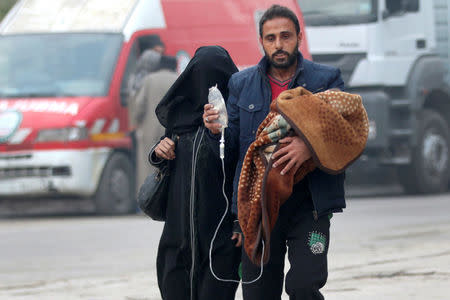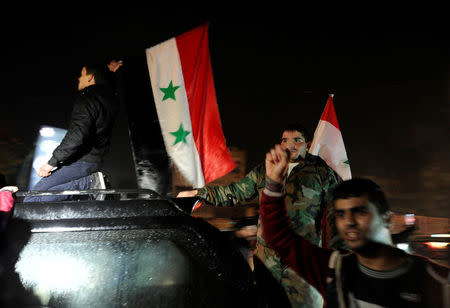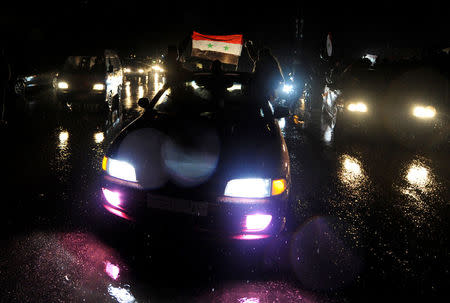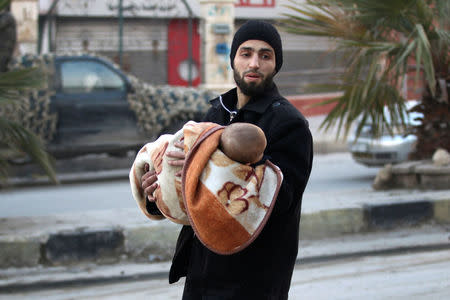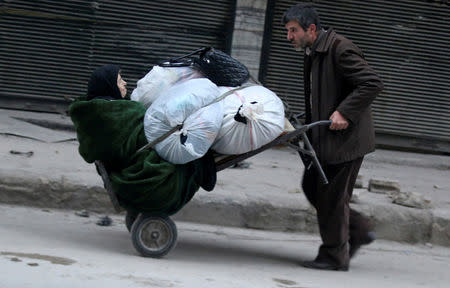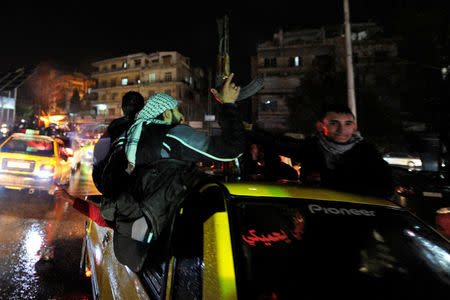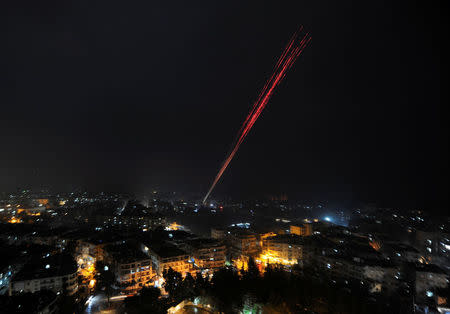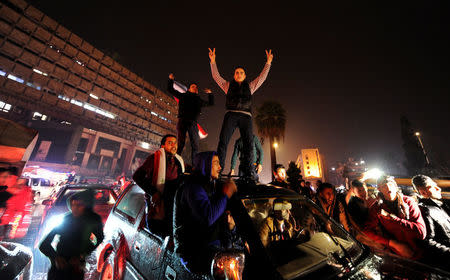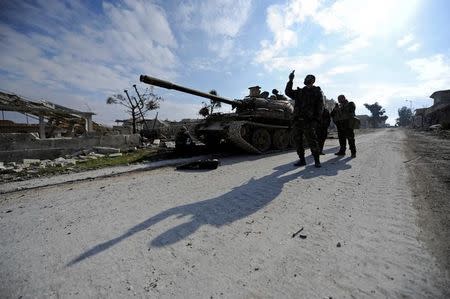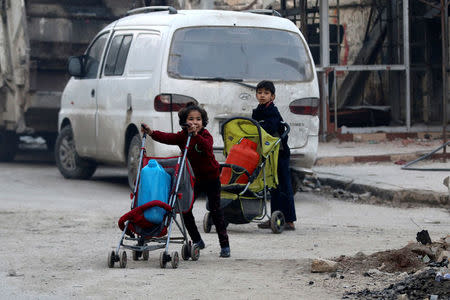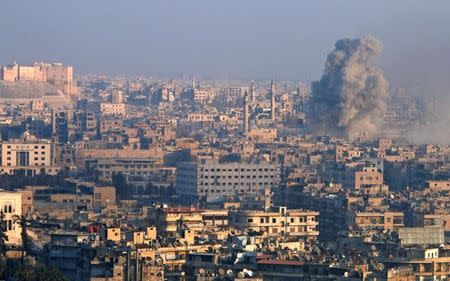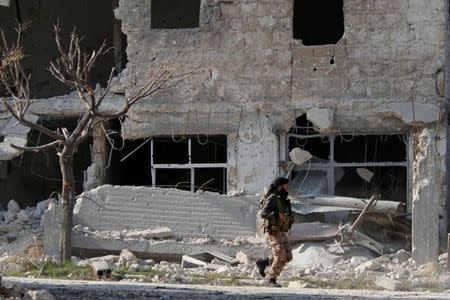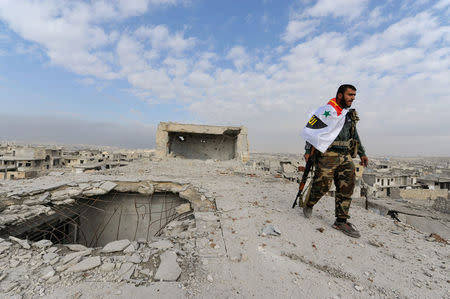Syrian general says Aleppo offensive in final stages
By Laila Bassam and Lisa Barrington ALEPPO, Syria/BEIRUT (Reuters) - The Syrian army and its allies are in the "last moments before declaring victory" in Aleppo, a Syrian military source said, after rebel defences collapsed on Monday, leaving insurgents in a tiny, heavily bombarded pocket of ground. A Reuters journalist in the government-held zone said the bombardment of rebel areas of the city continued non-stop on Monday, and a civilian trapped there described the situation as resembling "Doomsday". "The battle in eastern Aleppo should end quickly. They (rebels) don't have much time. They either have to surrender or die," Lieutenant General Zaid al-Saleh, head of the government's Aleppo security committee, told reporters in the recaptured Sheikh Saeed district of the city. Rebels withdrew from all districts on the east side of the Aleppo river on Monday afternoon after losing Sheikh Saeed in the south of their pocket in overnight fighting, the Syrian Observatory for Human Rights said. In government-held districts, soldiers started to fire into the air in celebration, carving tracer bullets into Aleppo's night sky, and car drivers honked their horns at what they believed was imminent victory, state television showed. The rebels' rapidly diminishing enclave had halved in only a few hours and Observatory director Rami Abdulrahman described the battle for Aleppo as having reached its end. "The situation is extremely difficult today," said Zakaria Malahifji of the Fastaqim rebel group fighting in Aleppo. An official from Jabha Shamiya, a rebel faction that is also present in Aleppo, said the insurgents might make a new stand along the west bank of the river. "It is expected there will be a new front line," said the official, who is based in Turkey. The White Helmets civil defence organisation and three other trapped aid groups made a desperate appeal for the international community to arrange safe passage for 100,000 civilians across a 4-km (2.5-mile) stretch of government-held territory. "If we stay, we fear for our lives. The women may be taken to camps, the men disappeared and anyone who is known to have supported civilians will face detention or execution," they said in a statement time stamped 9 p.m. (1900 GMT). Activists and two residents inside the remaining rebel enclave said at least 79 civilians were summarily executed in the Fardous and Saliheen districts by pro-government militias. "There are more than 100 corpses and others who could be still alive under the rubble whom no one is able to get to," said civil defence chief Ammar al Selmo. U.N. Secretary-General Ban Ki-moon was alarmed by unverified reports of atrocities against a large number of civilians, including women and children, Ban's spokesman said. Jan Egeland, the U.N. humanitarian adviser on Syria, tweeted that Russia's and Syria's governments would be responsible for any such abuses. "The Gov'ts of Syria & Russia are accountable for any and all atrocities that the victorious militias in Aleppo are now committing!," Egeland wrote. The rebels' sudden retreat represented a "big collapse in terrorist morale", a Syrian military source said. Syrian President Bashar al-Assad, backed by Russia, is now close to taking back full control of Aleppo, which was Syria's most populous city before the war and would be his greatest prize so far after nearly six years of conflict. "We are in the final moments before declaring the victory of the Arab Syrian army in the battle of East Aleppo. We could announce this any moment," the military source told Reuters. The Russian Defence Ministry said that since the start of the Aleppo battle, more than 2,200 rebels had surrendered and 100,000 civilians had left areas of the city that were controlled by militants. "People run from one shelling to another to escape death and just to save their souls. ... It's doomsday in Aleppo, yes doomsday in Aleppo," said Abu Amer Iqab, a former government employee in the Sukkari district in the heart of the rebel enclave. State television footage from Saliheen, one of the districts that had just fallen to the army, showed mounds of rubble and half-collapsed buildings, with bodies still lying on the ground and a few bewildered civilians carrying children or suitcases. REBELS While Aleppo's fall would deal a stunning blow to rebels trying to remove Assad from power, he would still be far from restoring control across Syria. Swathes of the country remain in rebel hands, and Islamic State retook Palmyra on Sunday. Tens of thousands of civilians remain in rebel-held areas, hemmed in by ever-changing front lines, pounded by air strikes and shelling, and without basic supplies, according to the Observatory, a British-based monitoring group. In the Sheikh Saeed district, an elderly couple stood lamenting their fate. "May every son return to his mother. I have suffered that loss. May other women not endure the same," said the woman, her arms raised to the sky. "I have lost my three children. Two died in battle and the third is kidnapped," she added, as an army officer attempted to calm her. Rebel groups in Aleppo received a U.S.-Russian proposal on Sunday for a withdrawal of fighters and civilians from the city's opposition areas, but Moscow said no agreement had been reached yet in talks in Geneva to end the crisis peacefully. The U.S. State Department said Russia had turned down the U.S. proposal for an immediate ceasefire and said it could not start for several days. The U.N. mediator for Syria, Staffan de Mistura, met with U.S. Secretary of State John Kerry and other State Department officials on Monday, State Department deputy spokesman Mark Toner said. "During their discussions, Department officials stressed the U.S.' unwavering commitment to a de-escalation of violence, the safe departure of Aleppo for all who want to leave, delivery of critical humanitarian aid and future inta-Syrian talks for a political solution to the crisis," Toner said. FIGHTING The Syrian army is backed by Russian war planes and Lebanese and Iraqi Shi'ite militias supported by Iran. Its advances on Monday were aided by a militia of Palestinian refugees in Syria, the Liwa al-Quds or Jerusalem Brigade, the general said. The mostly Sunni rebels include groups backed by the United States, Turkey and Gulf monarchies as well as hardline jihadists who are not supported by the West. A correspondent for Syria's official SANA news agency said the army had taken control of Sheikh Saeed, and more than 3,500 people had left at dawn. A Syrian official told Reuters: "We managed to take full control of the Sheikh Saeed district. This area is very important because it facilitates access to al-Amariya and allows us to secure a greater part of the Aleppo-Ramousah road." The road is the main entry point to the city from the south. Riad Hijab, Syria's chief opposition coordinator, said the rebels' defeat in Aleppo would not weaken the resolve of Assad's opponents, or push them to water down the demand that he quit. "If Assad and his allies think that a military advance in certain quarters of Aleppo will signify that we make concessions, then (I say) that will not happen," he told reporters after meeting French President Francois Hollande. The loss of Palmyra, an ancient desert city whose recapture from Islamic State in March was heralded by Damascus and Moscow as vindicating Russia's entry into the war, was an embarrassing setback to Assad. The Observatory reported that the jihadist group carried out eight executions of Syrian soldiers and allied militiamen in Palmyra on Monday while warplanes bombarded their positions around the city. Still, Islamic State made further advances around Palmyra, it and the Observatory said on Monday, including coming close to a military air base. Four other people, including two children, were shot dead while the jihadists cleared the city, the Observatory said. It said at least 34 people had died in air raids on an Islamic State-held village north of Palmyra, and that local officials said poison gas had been used. Islamic State accused Russia of the attack. Both Russia and Syria's military deny using chemical weapons. The Observatory said that four weeks into the army offensive in Aleppo, at least 415 civilians, including 47 children, had been killed in rebel-held parts of the city. It added that 364 rebel fighters had been killed in the eastern sector. It said rebel shelling of government-held west Aleppo had killed 130 civilians including 40 children. (Reporting by Laila Bassam in Aleppo, Lisa Barrington and Tom Perry in Beirut, Suleiman al-Khalidi in Amman, Stephanie Nebehay and Tom Miles in Geneva, Yeganeh Torbati in Washington, Michelle Nichols in New York and Vladimir Soldatkin in Moscow; Writing by Angus McDowall; Editing by Grant McCool and Peter Cooney)

